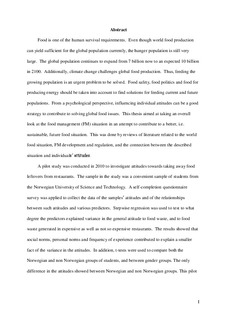| dc.contributor.advisor | Sjøberg, Britt-Marie Drottz | nb_NO |
| dc.contributor.author | Lu, Yunjie | nb_NO |
| dc.date.accessioned | 2014-12-19T14:42:38Z | |
| dc.date.available | 2014-12-19T14:42:38Z | |
| dc.date.created | 2012-12-03 | nb_NO |
| dc.date.issued | 2012 | nb_NO |
| dc.identifier | 573828 | nb_NO |
| dc.identifier.uri | http://hdl.handle.net/11250/270935 | |
| dc.description.abstract | Food is one of the human survival requirements. Even though world food production can yield sufficient for the global population currently, the hunger population is still very large. The global population continues to expand from 7 billion now to an expected 10 billion in 2100. Additionally, climate change challenges global food production. Thus, feeding the growing population is an urgent problem to be solved. Food safety, food politics and food for producing energy should be taken into account to find solutions for feeding current and future populations. From a psychological perspective, influencing individual attitudes can be a good strategy to contribute to solving global food issues. This thesis aimed at taking an overall look at the food management (FM) situation in an attempt to contribute to a better, i.e. sustainable, future food situation. This was done by reviews of literature related to the world food situation, FM development and regulation, and the connection between the described situation and individuals’ attitudes.
A pilot study was conducted in 2010 to investigate attitudes towards taking away food leftovers from restaurants. The sample in the study was a convenient sample of students from the Norwegian University of Science and Technology. A self-completion questionnaire survey was applied to collect the data of the samples’ attitudes and of the relationships between such attitudes and various predictors. Stepwise regression was used to test to what degree the predictors explained variance in the general attitude to food waste, and to food waste generated in expensive as well as not so expensive restaurants. The results showed that social norms, personal norms and frequency of experience contributed to explain a smaller fact of the variance in the attitudes. In addition, t-tests were used to compare both the Norwegian and non Norwegian groups of students, and between gender groups. The only difference in the attitudes showed between Norwegian and non Norwegian groups. This pilot study could give some indications for other future studies working with possible strategies to manage global food waste issues.
The discussion focuses on dilemmas related to the food situation involving food production and distribution, use and misuse, and the challenges related to food management and sustainability. | nb_NO |
| dc.language | eng | nb_NO |
| dc.publisher | Norges teknisk-naturvitenskapelige universitet, Fakultet for samfunnsvitenskap og teknologiledelse, Psykologisk institutt | nb_NO |
| dc.title | Toward Sustainable Food Managment for a Growing Human Population | nb_NO |
| dc.type | Master thesis | nb_NO |
| dc.source.pagenumber | 99 | nb_NO |
| dc.contributor.department | Norges teknisk-naturvitenskapelige universitet, Fakultet for samfunnsvitenskap og teknologiledelse, Psykologisk institutt | nb_NO |
